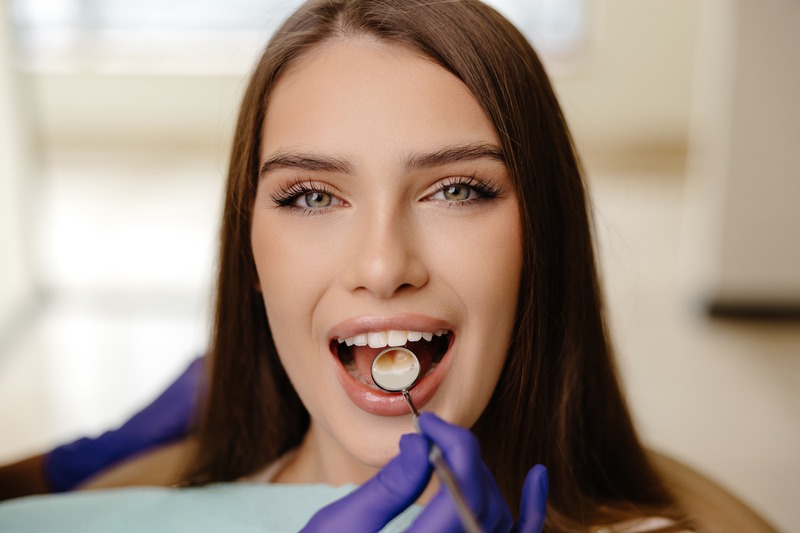Eco-friendly oral hygiene means using dental care products and practices that do not harm the environment. Regular dental hygiene routines involve plastic toothbrushes, traditional floss, and toothpaste packaging that significantly increase plastic waste. Choosing products and routines that reduce waste helps you maintain a healthier smile and protect our planet.
How to Practice Eco-Friendly Dental Care?
Choose an Eco-Friendly Toothbrush
Switching from plastic toothbrushes to sustainable options benefits both your oral hygiene and our environment. Bamboo toothbrushes, for example, are biodegradable and compostable. They can break down naturally in soil, reducing plastic waste significantly compared to regular toothbrushes.
Alternatively, toothbrushes made from recycled materials give discarded plastic a new purpose. These brushes typically have replaceable heads, allowing you to keep the handle and replace only what’s necessary. Small changes like these create significant impacts on environmental conservation.
Use Sustainable Dental Floss
Traditional floss tends to be nylon-based, packaged in plastic containers, and not biodegradable. Switching to eco-friendly floss alternatives is simple and efficient. Eco-friendly floss options are usually made from natural materials like silk, making them biodegradable and safe for the environment.
Sustainable floss can be bought in reusable glass containers, significantly reducing plastic waste. Refillable containers help cut down on packaging and pollution, making flossing beneficial to oral health and eco-sustainability at the same time.
Opt for Zero-Waste Toothpaste
Zero-waste toothpaste solutions can substantially reduce the environmental impact caused by traditional plastic toothpaste tubes. Toothpaste tablets, for example, come in compostable or refillable packaging and eliminate plastic waste completely. To use, chew the tablet, brush as usual, and rinse afterward.
Another option includes toothpaste in recyclable aluminum tubes or reusable glass jars. These alternatives reduce material waste and ensure you’re taking care of your oral hygiene without straining the ecosystem.
Eco-Friendly Mouthwash Practices
Regular mouthwash often comes packed inside plastic containers that frequently create plastic waste. You can create mouthwash at home using simple ingredients like baking soda, peppermint oil, and water. Homemade mouthwashes are effective in freshening breath and reducing packaging-related waste.
If prefer purchasing, shop brands stored in glass containers or aluminum bottles. These materials can be recycled conveniently, ensuring you maintain freshness without negatively impacting the ecosystem.
Water Conservation during Dental Care
Reducing water waste as you clean your teeth contributes greatly to safeguarding our planet’s water resources. Turn off the faucet while brushing rather than letting water run during the entire brushing period. Using a cup to rinse your mouth requires less water overall.
Repairing or promptly replacing leaking faucets also helps conserve water. Actively practicing water conservation during your dental hygiene routine reduces water waste considerably over time.
Proper Disposal of Dental Products
Properly disposing dental products helps minimize environmental harm. This includes carefully recycling toothpaste tubes, floss containers, and even plastic toothbrushes where possible. Checking with your local recycling service confirms the routine for recycling dental care packaging correctly.
Bamboo toothbrushes biodegrade quickly; however, they must have their bristles removed first for proper composting. Responsible disposal or recycling ensures your dental products don’t spend centuries in a landfill or contribute to pollution.
Select Natural Whitening Alternatives
Naturally, whitening teeth with environmentally friendly methods offers chemical-free ways for clearer smiles. Using baking soda occasionally helps remove stains and provides gentle whitening effects safely. Oil pulling with coconut oil contributes to brighter teeth without packaging waste.
Combining sustainable ingredients like lemons or activated charcoal moderately offers a way to naturally whiten teeth. Selecting eco-friendly whitening alternatives effectively cares for your smile without creating additional waste or harmful impacts.
Routine Dental Check-ups at Sustainable Clinics
Visiting an eco-conscious dental clinic supports environmentally friendly practices during regular dental check-ups. Such dental practices often use sustainable resources, like recycled papers, digital recording systems, and minimal disposable products. Choosing healthcare providers promoting sustainable practices actively supports eco-conscious services.
Dental offices emphasizing sustainability through energy conservation methods like efficient lighting and eco-friendly product usage significantly decrease their ecological footprints. Supporting these dental providers means taking a proactive role toward environmental stewardship while maintaining good oral health.
Managing Dental Emergencies Sustainably
If experiencing sudden toothache or injury, locate an eco-friendly emergency dentist. Such dentists actively use environmentally safer materials, limiting waste and providing fast care. Choosing eco-conscious dentists ensures your emergency visits minimally impact our ecosystem, promoting responsible healthcare services.
Investing in preventative oral care greatly reduces dental emergencies occurrence. Regular brushing, flossing, and dentist visits significantly lower the likelihood of dental pain or urgent issues, minimizing overall resource usage.
The Benefits of Environmentally-Friendly Denture Solutions
If seeking a solution for missing teeth, consider eco-aware treatments like implant supported dentures. These dentures provide durable options that lessen waste over traditional dentures requiring frequent adhesives and replacements. Implant solutions give a long-lasting and sustainable alternative benefiting oral health and the environment.
Sustainable oral appliances crafted with longevity in mind require fewer replacements. Selecting such solutions cuts down consumption and waste, aligning personal dental health goals with sustainable living practices.
Two Subsections Featuring Lists of Eco-Friendly Dental Care Tips
Daily Practices to Follow:
-
Switch to bamboo toothbrushes or brushes with recyclable handles.
-
Replace conventional floss with biodegradable options like silk or cornstarch-based floss.
-
Practice water-saving habits, including turning off your tap while brushing.
-
Choose toothpaste tablets or tooth powders without plastic packaging.
-
Make your mouthwash from natural ingredients stored in reusable glass containers.
Long-term Eco-Friendly Solutions:
-
Schedule regular visits with environmentally responsible dental practitioners.
-
Choose long-lasting dental treatments and materials, reducing future waste.
-
Support sustainable brands and dental healthcare providers using eco-friendly resources.
-
Optimize your technique by practicing preventive oral care, and limiting dental product consumption.
-
Participate in recycling programs designed specifically for dental products.
Closing Remarks
Choosing sustainable dental care practices provides personal health benefits while drastically reducing environmental impacts. Small decisions like biodegradable toothbrushes, eco-friendly floss, and sustainable toothpaste packaging contribute positively towards nature’s preservation. Sustainable dentistry involves conscious decisions aligning your dental routine with environmental responsibility, promoting long-term wellness for individuals and our planet.

